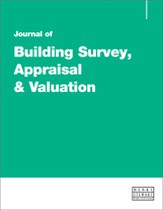The effects of the marine environment on the built environment of Llandudno: Comparing the effects from coastline to inland properties
Abstract
This paper looks at the impact of a marine environment upon building deterioration. While focusing upon the Welsh seaside resort of Llandudno, its findings could be applied to other coastal locations. Review of existing literature establishes the factors that impact upon a marine environment, such as temperature, wind speed and weather type. The changes in the pattern of weather over the last century are noted, due to many of Llandudno’s buildings being designed and built to withstand different conditions to those currently being encountered. The main mechanisms of deterioration due to a marine environment, the aerosol effect involving airborne salts and the crystallisation of those salts within building materials are explained. The reduction in the impact of these phenomena the farther a building is located from the shoreline is discussed. Literature is tested by means of four building surveys of buildings in differing locations within Llandudno. The buildings are all built for tourist accommodation within a 40-year period, 1870–1910. The surveys are presented as pictorial schedules of condition, including tests for the presence of marine salts. Findings support the literature in relation to distance from the sea. Issues such as shortened maintenance schedules for marine facing properties and the inappropriate use of impervious building materials are discussed. The paper concludes that particularly with the older building stock, it is important to be aware of the changing impact of the marine environment, but through appropriate maintenance cycles and the use of appropriate repair materials the buildings of Llandudno can be adequately protected from the impact of its marine environment.
The full article is available to subscribers to the journal.
Author's Biography
Evan Thomas is the Managing Director of PROBUILD (Llandudno) Ltd, a construction company based in North Wales. He comes from three generations of built environment professionals and has over twenty-eight years’ experience in the building industry. In 2011 he embarked on his academic journey completing his FdSc in Construction Management before completing a degree with honours in Building Surveying at University of Salford in 2016, winning both the Best Building Surveyor Award and the Dean of the School Award for Academic Excellence, thus, leading to this paper continuing into the start of his Professional Doctorate in 2016 at University of Salford. He practises and lives in Llandudno, North Wales where his keen understanding of the Victorian and Edwardian built environment has developed over the span of his career.
Citation
Thomas, Evan (2016, September 1). The effects of the marine environment on the built environment of Llandudno: Comparing the effects from coastline to inland properties. In the Journal of Building Survey, Appraisal & Valuation, Volume 5, Issue 2. https://doi.org/10.69554/DFRG7788.Publications LLP
